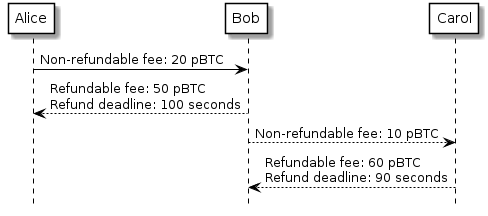/ home / newsletters /
Bitcoin Optech Newsletter #122
This week’s newsletter summarizes a discussion about bi-directional upfront fees for LN and relays the results of a small survey among experts about their preferences for taproot activation. Also included are our regular sections with updates about various projects.
Action items
None this week.
News
-
● Bi-directional upfront fees for LN: continuing a previous Lightning-Dev mailing list thread about upfront fees (see Newsletter #120), Bastien Teinturier posted a proposal to have both the party offering an HTLC and the party receiving it each pay fees to the other—although the receiving party receives a refund on their fees if the payment is settled within a specified amount of time. For example:

The forward fee (e.g., Alice→Bob) discourages spam; it must be paid even if the receiver refuses to relay the payment. The backward fee (e.g., Bob→Alice) encourages prompt settlement by having a refund deadline. Any ultimate receiver who wants to use hold invoices for longer than the remaining time will now need to pay the backwards fee. Any intermediate hop who doubts the payment will succeed before the deadline will now reject the payment, allowing previous hops to also settle the failed payment before the deadline and receive their refund.
In discussion of the idea, it did not appear that any fatal issue was discovered, although it was unclear how much enthusiasm it generated.
-
● Taproot activation survey results: Anthony Towns received survey responses from an unnamed set of 13 “smart dev-type people” about their preferences for a soft fork activation mechanism to use with taproot. The post includes his own personal summary of the results, which we quote in abbreviated form below:
-
Activation threshold should stay at 95% […]
-
[…] hope for a quick response [from miners] within a few months, but plan for it taking up to a year, even if everything goes well
-
Setting the [earliest possible activation time] to be about a month or two [after the Bitcoin Core release containing the activation code] is probably about right […]
-
Almost everyone is open to the idea of a flag day in some circumstances
-
If there’s a flag day, we should expect it to be a year or two away […]
-
There probably isn’t support for setting a flag day initially […]
-
Almost everyone wants to see as many nodes as possible enforce the rules after activation
-
Most people seem to be willing to accept bringing a flag day forward by mandatory signalling
-
There’s not a lot of support for opting-in to flag day activation by setting a configuration option
After Bitcoin Core developers finish working on the upcoming 0.21 release, it’s likely that the results of this survey will help them choose the activation parameters that will be used for taproot in a subsequent release. Of course, actual enforcement of the soft fork will depend on it gaining broad support among users—and users may decide to use an alternative activation mechanism. Further discussion of activation parameters is encouraged in the ##taproot-activation IRC chatroom (logs).
-
Notable code and documentation changes
Notable changes this week in Bitcoin Core, C-Lightning, Eclair, LND, Rust-Lightning, libsecp256k1, Hardware Wallet Interface (HWI), Bitcoin Improvement Proposals (BIPs), and Lightning BOLTs.
- ● C-Lightning #4162 updates logging to include whether a payment used a payment secret. Payment secrets were added to BOLT 11 in BOLTs #643 as part of the multipath payments feature to prevent probing attacks by nodes along the payment path. Payment secrets are supported by all LN implementations and will eventually be made compulsory by C-Lightning; logging which payments are using payment secrets makes it easier for the developers to know when it’s reasonable to make that change.
